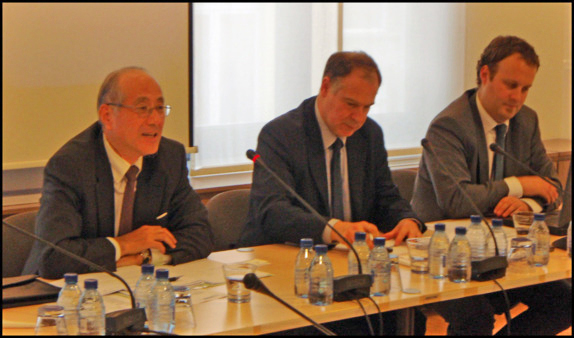Speech by H.E. Ambassador Odano at
Business Europe
"The Future of Japan-EU Relations with a focus on the Economic Relationship"
22nd October, 2009

H.E. Ambassador Odano attended Business Europe's Japan Network meeting on the 22nd October and made a speech on future Japan-EU relatiosn with a focus on the economic relationship.
Business Europe consists of 40 business federations from across Europe. It has 60 working groups of which debate proposed EU legislation and other business related issues. The Japan Network is one of these working groups which follows developments in Japan and implications for Japan-EU business.
The meeting was attended by representatives of European business federations, sectoral organisations and Japanese and EU businesses.
The following is the text of H.E. Ambassador Odano's speech:
"During the past four months, both Japan and the EU have gone through significant change. The European Parliament elections took place in June, President Barroso got reappointed in September, and the Lisbon treaty moved one step further towards its entry into force with the Irish referendum in October. In Tokyo, the Democratic Party of Japan, the DPJ, succeeded the Liberal Democratic Party, the LDP, which were in power for nearly half a century and formed a new government in September. Dr. Yukio Hatoyama assumed office as prime minister and his policy has been attracting much attention from the international community.
In the midst of these changes, the current financial and economic crisis still requires careful management especially by the G20 although it seems that the worst is behind us. It is also an imminent challenge to establish fair and effective international framework on climate change beyond 2012 in which all major emitters can participate at COP 15 in Copenhagen at the end of 2009. Today, I would like to discuss with you the future Japan-EU relations focusing on the economic and social fields.
At the end of the 1980s, when I was living in London, Japanese-European relations centered on trade, and were not without some friction. Thankfully, those severe trade frictions are now a matter of history. According to 2008 data, the number of Japanese companies operating in the EU is approximately 3200. In 2008, the net flow of direct investment from Japan to the EU amounted to approximately 23 billion dollars. In addition, the EU is the biggest FDI stock holder in Japan surpassing the U.S. In terms of trade, Japan was the 6th largest trading partner of the EU in 2008.
Within the first month, Japan’s new government enabled a number of meetings with European counterparts. PM Hatoyama met Italian President, Giorgio Napolitano, Austrian President, Heinz Fischer, and British Secretary of State for Business, Innovation and Skills, Peter Mandelson in Tokyo and Danish Prime Minister, Lars Løkke Rasmussen in Denmark in sucession. Foreign Minister Okada made his diplomatic debut at the Japan-EU Foreign Ministers Troika Meeting in New York in September and met with Swedish Foreign Minister Karl Bildt, Spanish Foreign Minister Miguel Ángel Moratinos, Dr. Javier Solana and Commissioner Ferrero-Waldner. At the working dinner, on the occasion of the G20 summit in Pittsburgh, PM Hatoyama sat next to President Barroso. Moreover, Economic Minister Naoshima visited Brussels last week and exchanged views with Vice President Verheugen as well as Environment Commissioner Dimas. I think that the new government has made a good start towards the strengthening of Japan-EU relations.
Although Japan and the EU has established fairly close relations, in order to develop further, what we need is not a passive attitude of waiting for issues to be brought before us, but an active engagement of specifying common challenges and deepening mutual cooperation to meet them. It is important for those of us who are like-minded sharing the same fundamental values and principles to frankly exchange opinions on what form our ideal international society would take. We should then share and promote that ideal while working together towards making it a reality.
At the U.N. Summit on Climate Change in September, PM Hatoyama promoted his pledge to cut greenhouse gas emissions by 25 percent from 1990 levels by 2020, which is premised on agreement on ambitious targets by all the major economies. In order to achieve this ambitious target, Japan will mobilize all available measures including the introduction of a domestic emission trading mechanism and a feed-in tariff for renewable energy. Japan will also consider the introduction of a global warming tax.
Japan and the EU have utilized the most advanced policy measures in the world by comparing notes on mutual undertakings. The “top-runner” approach of Japan and the Eco-Design Directive of the EU are good examples, both of which aim at improving energy efficiency. Such policy cooperation should be further promoted. Under the Japan-EU Science and Technology Agreement, which we have already initialed but are awaiting the final signature, we would like to accelerate R&D cooperation in the field of photovoltaic power and electricity storage to name but a few. Japan and the EU, both in an advanced stage of environment and energy policy measures, have to lead international negotiations. By doing so we must establish effective and practical international framework beyond 2012 for reducing global emissions at COP 15 in Copenhagen in which all major emitters including the U.S., China, and India can participate.
The current economic and financial crisis has worsened real economy more rapidly than anybody could have imagined and is raising unemployment, consequently having a serious impact on people’s daily lives. Large economies such as Japan and the EU, based on the agreement at the last G20 summit meeting in Pittsburg, have a responsibility to carry out stimulus measures aimed at the world economy as well as their national economies. It is imperative that we construct a stable economic and financial system which promotes sustainable development and is capable of averting similar crises in the future.
In a severe financial and economic situation, we have to warn against the temptation of protectionism. Japan and the EU must strongly resist that temptation learning from the experience after the Great Depression in 1929. Japan and the EU member states are basically trading nations with scarce natural resources. We share the interest of maintaining free trade and have to promote the WTO DDA negotiations towards early conclusion which improve international rules on trade and service.
Talking about the bilateral relations, leaders of Japan and the EU at the 18th Japan-EU Summit in Prague in May expressed their intention to cooperate in strengthening the integration of their economies with a view to better exploiting the full potential of their economic relations. For this purpose, Japan and the EU are focusing and working on a few specific non-tariff issues which are expected to bring concrete outcomes, in a mutually beneficial way and in a short period. Japan agreed on free trade and economic partnership with Swiss Confederation in September. We have the intention to similarly enhance economic and trade relations with the EU.
Moreover, Japan and the EU have continued regulatory reform dialogue since 1994 for the purpose of the promotion of bilateral trade and investment and regulatory cooperation by improving the business environment of Japan and the EU member states. Now we are trying to make the dialogue more effective and result-oriented.
Japan and several EU member states also have very similar demographic problems with rapidly aging populations and declining birthrates. It is urgent that we adapt and take effective measures against the decrease in industrial competitiveness and the potential of economic growth which may result. However we also need to reverse the trend of declining birth rates as well as improve our education and social security systems. Sharing best practice on these issues will prove useful in formulating effective strategies. Furthermore, Japanese and European people have a strong interest in consumer safety. Japan and the EU will be able to lead the world and increase benefits to consumers in the world through cooperation in the field of standard setting to ensure consumer safety.
